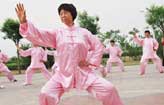Health
Sounds like ear trouble
Updated: 2011-08-17 07:54
By Liu Zhihua (China Daily)
Li Hongxu, a 39-year-old Chinese teacher at a Beijing primary school, can't keep the dismay off his face when the doctor says his right ear is developing neural hearing loss.
Li practically lost his hearing nine years ago after he experienced sudden facial paralysis.
On April 16, he started to experience dizziness and tinnitus in the right ear. He went to a nearby small hospital two days later, but it failed to identify the cause and Li just hoped the problem would go away.
"I should have gone to (another) hospital earlier, instead of thinking the problem was temporary," Li says.
"Neural deafness has no instant or definite cure, especially in delayed cases," says Xia Yin, Li's doctor, who is vice director of the department of otology at Beijing Tongren Hospital.
"The only thing we can do now is to prescribe medicines and injections that nurture and repair the nerves, and dilate the blood vessels, and hope the situation will be controlled and reversed."
Neural deafness, as the name indicates, follows degeneration or damage to the auditory nerve, or the hair cells, which is quite common among old people.
"If you think deafness (neural deafness) is a concern only for old people, you are wrong. The fact is, it has a tendency to affect youngsters nowadays," Xia says.
More people under 50 are showing up at the hospital for hearing loss treatment, mostly due to unhealthy lifestyles rather than sudden injury, Xia says.
Some of Xia's patients are just teenagers, while others are in their 20s or 30s.
"The increase in young people seeking hearing loss treatment could underline people's growing awareness of health," Xia says. "But it is more likely to indicate that modern city lifestyles contribute greatly to hearing loss."
The auditory systems of people above 50 have a tendency to degenerate, but for people under that age, there should be no natural dysfunction of the system.
"Bodies of people in their 20s and 30s should be at peak performance. Generally speaking, neural deafness shouldn't happen to them," Xia says.
The most extreme case Xia has come across is of a boy who lost his hearing completely after secondary school entrance exams.
"He was under great pressure because of the exams, and often stayed up late, which was the main cause of his suffering," Xia says.
Exposure to frequent high intensity sounds, pressure, as well as insufficient rest will stress the body, making organs react in a defensive way, ultimately leading to dysfunction of the autonomic nervous system, including the ears, Xia explains.
Besides, loud sound can rip off the hair cells and damage auditory nerves directly, Xia notes.
"People always say work hard and play harder, but in my opinion that is a very dangerous lifestyle," Xia says.
"Such an attitude will put people in a vulnerable situation to many diseases, including deafness."
The background noise of big cities, using earphones and listening to loud music for a long time, working around the clock, a lack of exercise and rest, stress, bad moods, intake of contaminated air, water, and food, are all risk factors for deafness, Xia says.
"Staying in a good mood, avoiding alcohol and cigarettes, working and relaxing in a reasonable way, these are the healthy lifestyles we should adopt when living in cities."
E-paper

Going with the flow
White-collar workers find a traditional exercise helps them with the frustrations of city life
The light touch
Long way to go
Outdoor success
Specials

Star journalist remembered
Friends, colleagues attended a memorial service to pay tribute to veteran reporter Li Xing in US.

Robots seen as employer-friendly
Robots are not new to industrial manufacturing. They have been in use since the 1960s.

A prosperous future
Wedding website hopes to lure chinese couples
